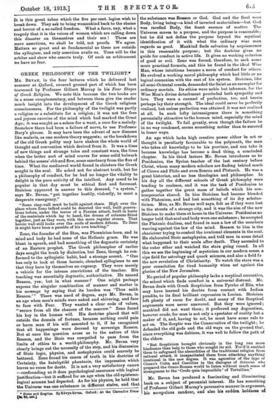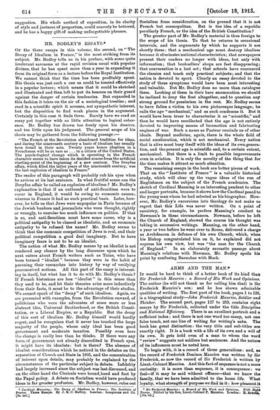GREEK PHILOSOPHY OF THE TWILIGHT.*
Mn. BEVAN, in the four lectures which he delivered last summer at .1)xford, covered ground part of which has been traversed by Professor Gilbert Murray in his Four Stages of Greek Religion. We note this because the two books are in a sense complementary, and between them give the reader much insight into the development of the Greek religious consciousness. For the philosophy of the twilight was partly a religion or a substitute for a religion ; it was not the free
and joyous exercise of the mind which had marked the Great Age; it was sought as a solace for a want, a cure for a malady. Somehow there had been a failure of nerve, to use Professor Bury's phrase. It may have been the advent of new diseases like malaria, as one modern theory suggests ; or the breakdown of the old Greek polity may have shaken the whole world of thought and convention which derived from it. It was a time Of new things and strange tales and constant wars, the time when the better sort of mind craves for some solid bulwark behind the senses' ebb and flow, some sanctuary from the flux of time. What the mediaeval world found in cloisters the Greek Bought in the soul. He asked not for abstract truth, but for philosophy of conduct, for he had no longer the vitality to delight in the pure activity of the intellect. Any creed to be popular in that day must be ethical first and foremost.
Stoicism appeared in answer to this demand, "a system," says Mr. Bevan, "put together hastily, violently, to meet a
desperate emergency."
"Some ring-wall must be built against chaos. High over the place where Zeno talked could be descried the wall, built genera- tions before, under the terror of a Persian attack, built in haste of the materials which lay to hand, the drums of columns fitted together, just as they were, with the more regular stones. That heroic wall still looks over the roofs of modern Athens. To Zeno it might have been a parable of his own teaching."
Zeno, the founder of the Stoa, was Phoenician-born, and in mind and body he had none of the Hellenic grace. He was blunt in speech, and bad something of the dogmatic certainty of an Eastern prophet. The Greek philosopher of earlier days sought the truth by dialectics, but Zeno, though he con- formed to the syllogistic habit, had a strange accent. "One has only to look at those laconic, clenched syllogisms to see that they have by themselves no cogency. They were merely a vehicle for the intense convictions of the teacher. His
teaching was essentially dogmatic, authoritative. He named Reason, yes ; but in what manner ? One might perhaps express the singular combination of manner and matter in his message by saying that its burden was 'Thus saith
Reason." There was need of dogma, says Mr. Bevan, in an age when men's minds were naked and shivering, and face to face with Fear. They wanted a clear code of values, "secure from all the chances of the morrow." Zeno found his key in the human will. His doctrine placed that will outside the domain of fortune, because nothing could pain or harm man if his will assented to it, if he recognized that all happenings were decreed by sovereign Reason. But at once the question arose as to the nature of this Reason, and the Stoic was compelled to pass from the limits of ethics to a world-philosophy. Mr. Bevan very clearly brings out the necessity of the step, and his discussion of Stoic logic, physics, and metaphysics could scarcely be bettered. Zeno found his canon of truth in his doctrine of
Certainty, the kalaleptik5 phantasia, the impression which leaves no room for doubt. It is not a very satisfactory canon
—confounding as it does psychological assurance with logical justification—but it sufficed, for an age when the old epistemo- logical acumen had departed. As for his physics, he held that the Universe was one substance in different states, and that
•• Stoics and ficsptics, litzEdwynlievan. Oxford: At the Clarendon Press. Pik 4d, net.1
the substance was Reason or God. God and the Soul were Body, living being—a kind of inverted materialism—but God was rarefied Body, the finest essence of matter. The Universe moves to a purpose, and the purpose is reasonable ; but he did not define the purpose beyond the mystical identification of it with what the ordinary wise man regards as good. Mankind finds salvation by acquiescence in this reasonable purpose; but the doctrine gives no guide for conduct in active life. It gives no working criterion of good or evil. Zeno was forced, therefore, to seek some more practical formula, and this he found in the ideal Wise Man, whose intuitions became a norm of conduct for others. He evolved a working moral philosophy which had little or no logical connexion with the rest of his system. Stoicism, like all semi-Oriental creeds, demanded the Saint as an exemplar for ordinary mortals. Its ethics were noble but inhuman, for the Wise Man's divine detachment precluded both sympathy and love. They were a counsel of perfection, too, and herein perhaps lay their strength. The ideal could never be perfectly realized, but unless perfection was attained it was not realized
at all. In such lofty intransigence there is something perennially attractive to the human mind, especially the mind
of the twilight. To fail greatly, even though the failure be in no way condoned, seems something nobler than to succeed in lesser ways.
An age which lacks high creative power either in art or thought is peculiarly favourable to the polymath, the man who takes all knowledge to be his province, and can take it because knowledge has become a dead thing, a concluded chapter. In his third lecture Mr. Bevan introduces us to Posidonius, the Syrian teacher of the last century before Christ, whom many modern scholars are finding behind muck of Cicero and Philo and even Seneca and Plutarch. He was a great historian, and no less theologian and philosopher. In his day all the different schools of Greek philosophy were tending to coalesce, and it was the task of Posidonius to gather together the great mass of beliefs which his con- temporaries shared. In him Stoicism had become blended with Platonism, and had lost something of its dry scholas- ticism. Men, as Mr. Bevan well says, felt as if they were lost in the streets of a strange city, and it was the aim of the new Stoicism to make them at home in the Universe. Posidonius no longer held that soul and body were one substance ; he accepted the Platonic dualism, and found in man a law of the members warring against the law of the mind. Reason to him is the charioteer trying to control the irrational elements in the soul.
He elaborated Stoic metaphysics, and told men in some detail what happened to their souls after death. They ascended to the outer ether and watched the stare going round. In all this we see the beginning of mysticism in our modern sense, a ripe field for astrology and quack sciences, and also a field fo the new revelation of Christianity. To watch the stars was a poor consolation for tired humanity when set against the glories of the New Jerusalem.
No period of popular philosophy lacks a sceptical corrective, the school which finds comfort in a universal distrust. Mr.
Bevan deals with Greek Scepticism from Pyrrho of Ells, who may have learned his doubts from contact with Indian pundits, to its final brilliant expression in Lucian. Stoicism left plenty of room for doubt, and many of the Sceptical arguments were never answered. But they were ignored ; mankind did not want them ; it preferred any dogmatism, however crude, for man is not only a spectator of reality but a maker of it, and, having to act, he must have some rule to act on. The Sceptic was the Conservative of the twilight; he defended the old gods and the old ways on the ground that, since everything was dubious, it was well to follow the path of the elders.
"But Scepticism brought obviously in the long run more hindrance than help to those who sought its aid. For if it enabled them to safeguard the absurdities of the traditional religion from rational attack, it incapacitated them from attacking anything irrational in the new dogma. It was agnostics of the type of Cicero's Cotta and Caecilius in the dialogue of Octavius who prepared the Greco-Roman world to listen without much sense of strangeness to the 'Credo quia impossibile' of Tertullian."
Mr. Bevan has produced a fascinating and illuminating book on a subject of perennial interest. He has something of Professor Gilbert Murray's persuasive manner in argument, his scrupulous candour, and also his sudden boldness of
suggestion. His whole method of exposition, in its clarity of style and justness of proportion, could scarcely be bettered, and he has a happy gift of making unforgettable phrases.















































 Previous page
Previous page